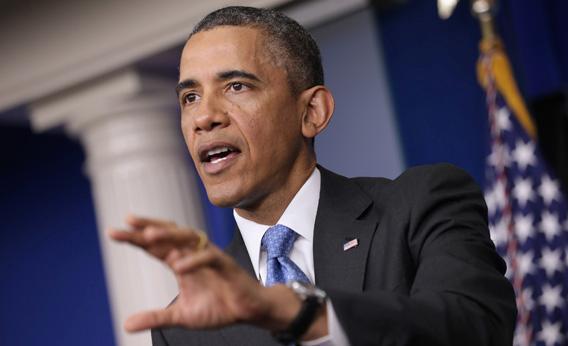President Obama was asked at his Monday news conference whether he has the “juice” to get his agenda through Congress. But presidential juice is like the juice at fancy hotels: It comes in a tiny little glass. The framers were very anti-juice. They designed a system that makes it very hard for the president to accumulate a lot of it.
President Obama tried to explain this to the press, pointing out that he’s not the only actor in the Washington drama. He’s got to deal with a reluctant Congress and an oppositional Republican party. It was a reasoned explanation for gridlock and could very well stir people to agreement , at least for the five minutes they were paying attention. The problem wasn’t the president’s logic. The problem was his tone, which suggested he was defeated, licked, and out of gas. He may still be carrying on the battle, but he’d lost the fight.
A lot of the recent criticism of the president falls into the action-hero view of the presidency that I wrote about last fall. There is a persistent notion that a president can overcome obstacles through force of will. This president suffers particularly from the superhero delusion because during the 2008 campaign he summoned vast crowds and promised achievements that could only be accomplished through special powers.
Even the most rhetorically successful president still has to deal with the engine of Congress, which is broken in any number of ways. Some of it is structural: Lawmakers are more partisan than ever and in the Senate the filibuster makes 60 the threshold for any action. A president applying his juice has fewer people to convince and must convince more of them.
Despite these structural obstacles, presidents are expected to do more. That’s why every president has complained about the outsized expectations of the office. LBJ—the muscular model to whom Obama is sometimes unfavorably compared —told Richard Nixon that being president was like being a jackass in a hail storm. Sometimes you just have to stand there and take it.
Harry Truman said about the presidency: “I sit here all day long trying to persuade people to do things they ought to have sense enough to do without my persuading them … That’s all the power of the president amount to.” President Obama echoed this frustration at his news conference: “You seem to suggest that somehow these folks over there have no responsibilities, and that my job is to somehow get them to behave,” he said of Congress. “That’s their job. They’re elected— members of Congress are elected in order to do what’s right for their constituencies and for the American people.”
But if every president faces the same outsized expectations, what distinguishes the great ones is that they keep trying and even if that doesn’t work, they keep making it look like they’re trying. Bold persistent experimentation, is what FDR called it. “Take a method and try it. If it fails, admit it frankly, and try another. But by all means, try something,” said Roosevelt. Try something. It will either work or people will wonder why your adversaries aren’t trying as hard as you are. Obama doesn’t seem to have actually given up. He’s reaching out to Republican senators and those he’s worked with attest to his sincerity in getting deals on immigration and the budget. But that was hard to tell from the news conference.
Let’s assume, for the purpose of this narrow argument, the president is right about the structural hurdles he faces. Let’s assume Republicans are totally at fault. So, the president has chosen to walk down the hall from the Oval Office to explain this to reporters who he knows will ask about his agenda. What is the best way for him to achieve his policy goals?
The president chose sweet reason. On a host of issues, he patiently explained the situation and why the choices Congress is making are not rational. It was cogent but likely to move no one. If you’re going to bestir yourself from the Oval Office, shouldn’t you throw your back into it? Instead of telling people about the gridlock, why not show them how hard you’re working despite the long odds. The image of the half-crazed president sweating in the boiler room might stir people to think: hey, why aren’t the vacationing Republicans in Congress trying just as hard?
This is why Bill Clinton talked about working “till the last dog dies.” He may not have had superpowers, but he was going to behave like he did.
Working harder—and seeming to work harder—is not a fantastical strategy. It simply tries to imagine how Obama might use his existing tools to achieve the limited goals of his afternoon news conference. The president has these tools. He certainly knows how to tell a story to convey how high the stakes are. He could talk about cancer patients not getting their chemotherapy or William McCormick, who lives in poverty and depends on Meals on Wheels but gave up his food anyway because he knew others were probably suffering more under sequestration cuts. The president knows that by telling these stories and witnessing to these injustices, he becomes a champion of a cause, not an analyst of it.
Would this work? We know the powers of the bully pulpit are overstated, so probably not, but in a world of limited options it’s one that would seem to serve his interests. But there is a trope in superhero movies where the good guy unloads his gun at the bad guys, then in a last ditch attempt to do something (anything!), he throws the empty gun at them. This is a desperate act that is unlikely to work, but it does convey the passion of the character who doesn’t have many options left. Throw the gun!
